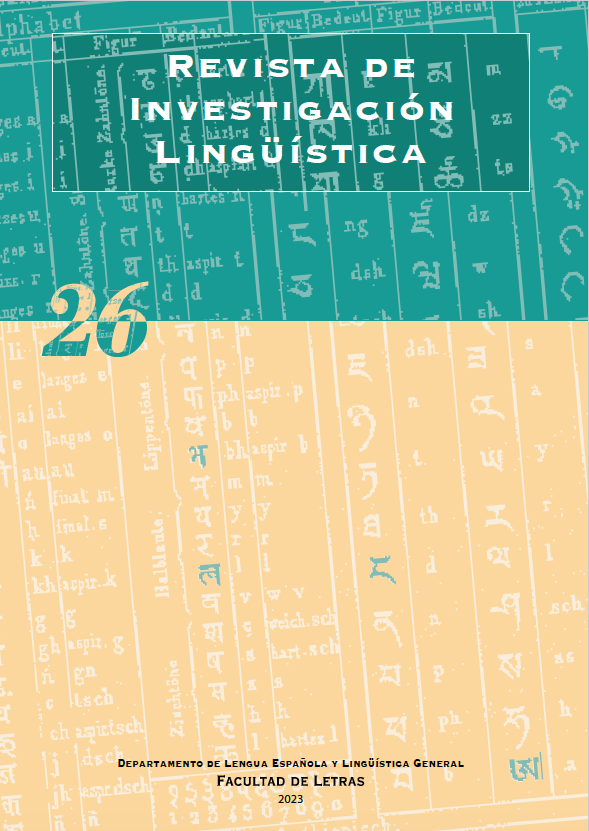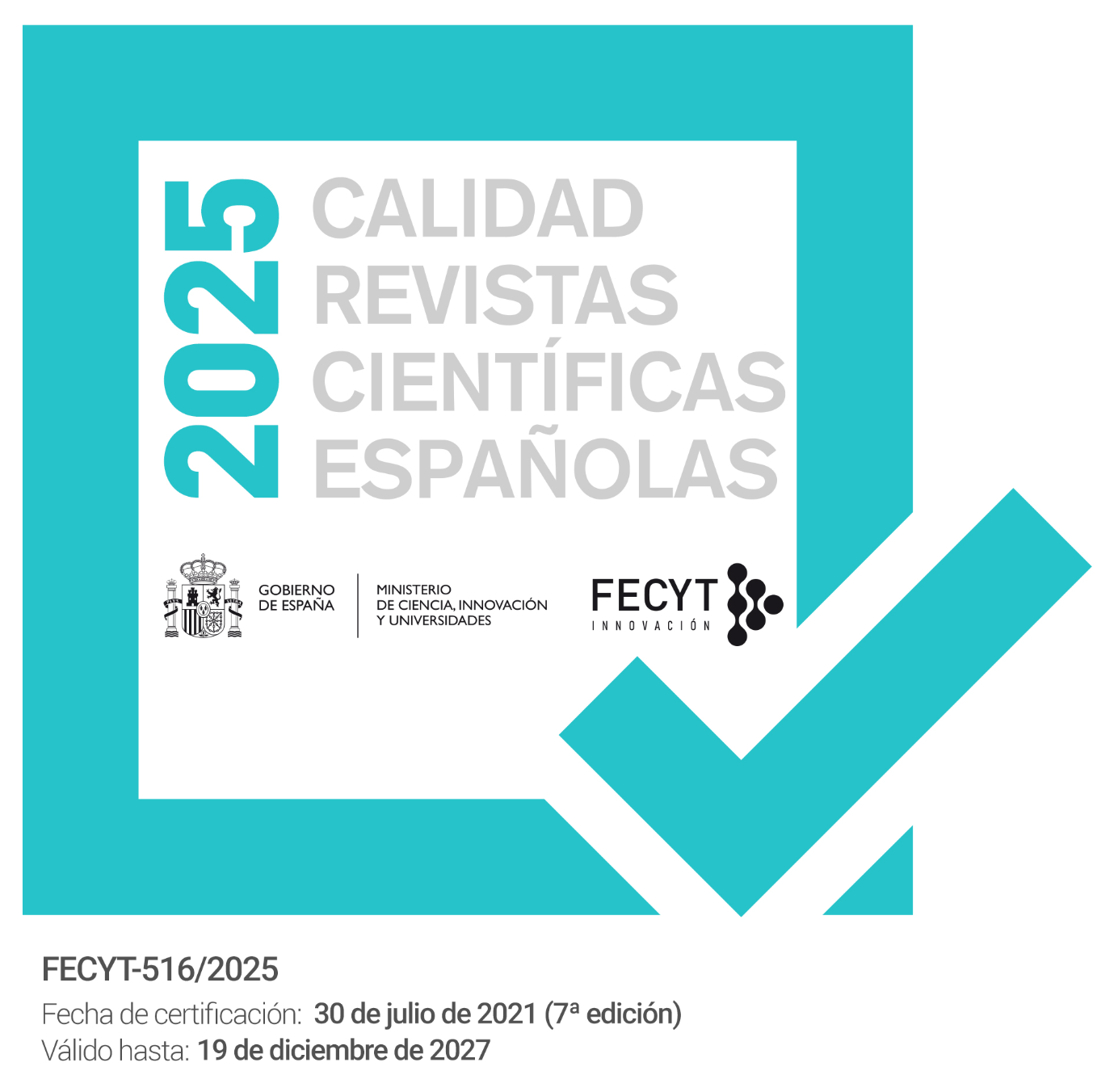The notion of culture behind linguistic determinism/relativism
Abstract
The relation between language and culture is a recurrent topic in the fields of philosophy, linguistics and anthropology. Among the theoretical approaches to the problem are linguistic determinism and relativism, according to which language plays a fundamental role in shaping the speakers’ worldview. This article analyses the notion of culture underlying the premises of linguistic determinism/relativism, understood as language ideologies.
The study concludes that both perspectives are based on an ahistorical view of language and culture, which obscures their dynamic and heterogenous nature, although linguistic relativism is more flexible in this respect. Accordingly, linguistic determinism is associated with a classical or descriptive view of culture, whereas linguistic relativism is considered compatible with both the descriptive and the symbolic notion of culture.
Downloads
-
Abstract1045
-
PDF (Español (España))720
References
ABOUCHAAR, Alberto (2012): «Contra el hablante/oyente ideal y la ideología del monolingüismo», Forma y Función, 25(2), pp. 85-97. En línea: <https://revistas.unal.edu.co/index.php/formayfuncion/article/view/39832> [13/02/2023].
ANDERSON, Benedict (1991[1983]): Imagined communities. Reflections on the origins and spread of nationalism, Londres, Verso.
BLANCO, Antonio (2017): La relatividad lingüística (variaciones filosóficas), Madrid, Akal.
BORODITSKY, Lera (2001): «Does language shape thought?: Mandarin and English speakers’ conceptions of time», Cognitive Psychology, 43, pp. 1-22. DOI: https://doi.org/10.1006/cogp.2001.0748
CHOMSKY, Noam (1957): Syntactic structures, La Haya, Mouton. DOI: https://doi.org/10.1515/9783112316009
CHOMSKY, Noam (1959): «Review of Verbal behavior by B. F. Skinner», Language, 35(1), pp. 26-58. DOI: https://doi.org/10.2307/411334
CHOMSKY, Noam (1965): Aspects of the theory of syntax, Cambridge, MIT Press.
CISTERNAS, César (2019): «La ideología del relativismo lingüístico en el debate por la revitalización del mapudungún», Lenguas y Literatura Indoamericanas, 21, pp. 1-25. En línea: <https://revistas.ufro.cl/ojs/index.php/indoamericana/article/view/2522> [13/02/2023].
COADY, Ann (2018): «The origin of sexism in language», Gender and Language, 12(3), pp. 271-293. DOI: https://doi.org/10.1558/genl.31445
CUCHE, Denys (2002[1966]): La noción de cultura en las ciencias sociales, Buenos Aires, Nueva Visión.
DEUTSCHER, Guy (2010): Through the language glass. Why the world looks different in other languages, Nueva York, Metropolitan Books.
FISHMAN, Joshua (1982): «Whorfianism of the third kind: ethnolinguistic diversity as a worldwide societal asset (the Whorfian hypothesis: varieties of validation, confirmation, and disconfirmation II)», Language in Society, 11, pp. 1-14. DOI: https://doi.org/10.1017/S0047404500009015
FISHMAN, Joshua (2001): «Why is it so hard to save a threatened language?», en Joshua Fishman (ed.), Can threatened languages be saved?, Clevedon, Multilingual Matters, pp. 1-22.
GEERTZ, Clifford (2003[1973]): La interpretación de las culturas, Barcelona, Gedisa.
IRVINE, Judith (1989): «When talk isn’t cheap: language and political economy», American Ethnologist, 16(2), pp. 248-267. DOI: https://doi.org/10.1525/ae.1989.16.2.02a00040
IRVINE, Judith y Susan GAL (2000): «Language ideology and linguistic differentiation», en Paul Kroskrity (ed.), Regimes of language: Ideologies, polities, and identities, Santa Fe, School of American Research Press, pp. 35-84.
KONISHI, Toshi (1993): «The semantics of grammatical gender: a cross-cultural study», Journal of Psycholinguistic Research, 22, pp. 519-534. DOI: https://doi.org/10.1007/BF01068252
KROEBER, Alfred y Clyde KLUCKHOHN (1952): Culture. A critical review of the concepts and definitions, Cambridge, Harvard University.
LINDQVIST, Anna, Emma RENSTRÖM y Marie GUSTAFSSON (2019): «Reducing a Male Bias in Language? Establishing the Efficiency of Three Different Gender-Fair Language Strategies», Sex Roles, 81, pp. 109-117. DOI: https://doi.org/10.1007/s11199-018-0974-9
MAJID, Asifa, Melissa BOWERMAN, Sotaro KITA, Daniel HAUN y Stephen LEVINSON (2004): «Can language restructure cognition? The case for space», Trends in Cognitive Sciences, 8(3), pp. 108-114. DOI: https://doi.org/10.1016/j.tics.2004.01.003
MAKIHARA, Miki (2004): «Linguistic syncretism and language ideologies: transforming sociolinguistic hierarchy on Rapa Nui (Easter Island)», American Anthropologist, 106(3), pp. 529-540. DOI: https://doi.org/10.1525/aa.2004.106.3.529
MCWHORTER, John (2014): The language hoax. Why the world looks the same in any language, Nueva York, Oxford University Press.
MYHILL, John (2003): «The native speaker, identity, and the authenticity hierarchy», Language Sciences, 25, pp. 77-97. DOI: https://doi.org/10.1016/S0388-0001(01)00023-7
PINKER, Steven (1999[1994]): El instinto del lenguaje. Cómo crea el lenguaje la mente, Madrid, Alianza Editorial.
REYNOSO, Carlos (2014): Lenguaje y pensamiento. Tácticas y estrategias del relativismo lingüístico, Buenos Aires, SB Editorial.
SARZURI-LIMA, Marcelo (2012): «De la palabra al texto: colonialidad lingüística y luchas interculturales», Revista Integra Educativa, 5(1), pp. 59-85. En línea: <http://www.scielo.org.bo/scielo.php?script=sci_arttext&pid=S1997-40432012000100003> [13/02/2023].
SCHLEE, Günther (2015): «Language and ethnicity», en James Wright (ed.), International encyclopedia of the social and behavioral sciences, 2.a ed., vol. 13, Ámsterdam, Elsevier, pp. 251-255. DOI: https://doi.org/10.1016/B978-0-08-097086-8.53054-2
SERA, Maria D., Chryle ELIEFF, James FORBES, Melissa CLARK BURCH, Wanda RODRÍGUEZ y Diane Poulin DUBOIS (2002): «When language affects cognition and when it does not: an analysis of grammatical gender and classification», Journal of Experimental Psychology, 131, 3, pp. 377-397. DOI: https://doi.org/10.1037/0096-3445.131.3.377
SILVERSTEIN, Michael (2000): «Whorfianism and the linguistic imagination of nationality», en Paul Kroskrity (ed.), Regimes of language. Ideologies, polities, and identities, Santa Fe, SAR Press, pp. 35-138.
SWIM, Janet, Robyn MALLETT y Charles STANGOR (2004): «Understanding subtle sexism: detection and use of sexist language», Sex Roles, 51(3-4), pp. 117-128. DOI: https://doi.org/10.1023/B:SERS.0000037757.73192.06
SWINEHART, Karl y Kathryn GRABER (2012): «Tongue-tied territories: Languages and publics in stateless nations», Language & Communication, 32(2), pp. 95-97. DOI: https://doi.org/10.1016/j.langcom.2011.05.007
TAYLOR, Charles (2016): The language animal. The full shape of the human linguistic capacity, Cambridge, Harvard University Press. DOI: https://doi.org/10.4159/9780674970250
THOMPSON, John (1998[1990]): Ideología y cultura moderna. Teoría crítica social en la era de la comunicación de masas, 2.a ed., México D.F., Universidad Autónoma Metropolitana.
TYLOR, Edward (1975[1871]): «La ciencia de la cultura», en Joel Kahn (ed.), El concepto de cultura: textos fundamentales, Barcelona, Anagrama, pp. 29-46.
VON HUMBOLDT, Wilhelm (1988[1836]): On language. The diversity of human language-structure and its influence on the mental development of mankind, Cambridge, Cambridge University Press.
VON TREITSCHKE, Heinrich (1975[1894]): The history of Germany in the nineteenth century, Chicago, University of Chicago Press.
VOSSLER, Karl (1957[1923]): Filosofía del lenguaje. Ensayos, Buenos Aires, Losada.
WEBER, Max (2001[1906]): Ensayos sobre metodología sociológica, Buenos Aires, Amorrortu.
WEBER, Max (1964[1925]): Economía y sociedad. Esbozo de sociología comprensiva, 2.a ed., México D. F., Fondo de Cultura Económica.
WHORF, Benjamin (1956a[1936]): «A linguistic consideration of thinking in primitive communities», en John Carroll (ed.), Language, thought, and reality. Selected writings of Benjamin Lee Whorf, Cambridge, The M.I.T. Press, pp. 65-96.
WHORF, Benjamin (1956b[1941]): «Language, mind, and reality», en John Carroll (ed.), Language, thought, and reality. Selected writings of Benjamin Lee Whorf, Cambridge, The M.I.T. Press, pp. 246-270.
WINAWER, Jonathan, Nathan WITTHOFT, Michael FRANK, Lisa WU, Alex WADE y Lera BORO-DITSKY (2007): «Russian blues reveal effects of language on color discrimination», Proceedings of the National Academy of Sciences, 104(19), pp. 7780-7785. DOI: https://doi.org/10.1073/pnas.0701644104
YULE, George (2020): The study of language, 7.a ed., Cambridge, Cambridge University Press.
ZENKER, Olaf (2014): «Linguistic relativity and dialectical idiomatization: language ideologies and second language acquisition in Irish language revival of Northern Ireland», Journal of Linguistic Anthropology, 24(1), pp. 63-83. DOI: https://doi.org/10.1111/jola.12037
Copyright (c) 2023 Journal of Linguistic Research

This work is licensed under a Creative Commons Attribution-NonCommercial-NoDerivatives 4.0 International License.
The works published in this magazine are subject to the following terms:
1. The Publications Service of the University of Murcia (the publisher) preserves the economic rights (copyright) of the published works, and favors and allows the reuse of same under the license of use indicated in point 2.
2. The papers are published in the electronic edition of the magazine under a Creative Commons Attribution-NonCommercial-NoDerivative 3.0 Spain license (legal text). Papers may be copied, used, disseminated, transmitted and publicly exhibited if the following requirements are met: i) The authorship and the original source of its publication (magazine, editorial and URL of the work) must be cited; ii) The works cannot be used for commercial purposes; iii) The existence and specifications of this user license must be explicitly mentioned.
3. Self-archiving conditions. Authors can electronically disseminate pre-print versions (version before being evaluated) and / or post-print versions (version evaluated and accepted for publication). This makes possible its circulation and diffusion earlier and with it a possible increase in its citation and reach among the academic community. RoMEO color: green.










